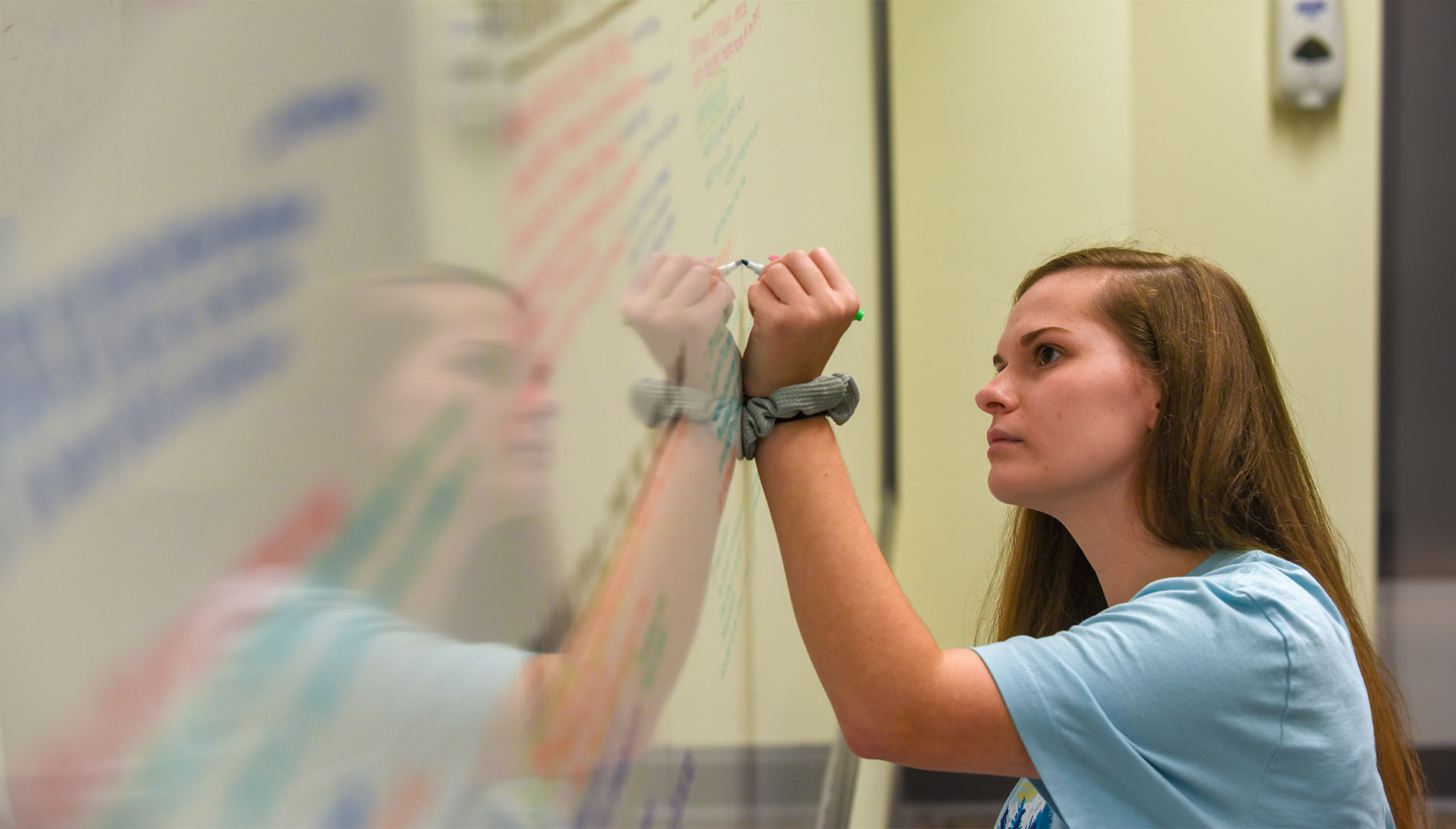Between the end of the fall semester and the beginning of the spring semester, many students rethink their college decisions: “Am I in the right major? Should I stay in college?” Reports suggest college students drop out for a variety of academic, financial and personal reasons, but here are five common college struggles and hacks to stay the course.
1. Academic Overwhelm and Time Management Issues
One of the toughest transitions to college is the sheer amount of free time you have, with only about 15 hours in class each week. There are over 150 hours where no one checks your homework or sleep, but that work may take longer to complete than it did in high school. Don't be surprised if you struggle to estimate the time you need on a new assignment at first. If you feel overwhelmed by the workload, figure out ways to break your work or projects into smaller steps to get going.
COLLEGE-HACK: Calculate your hours and create a concrete but flexible plan.
Academic success experts suggest estimating two to three hours a week of work per class credit hour and then other activities that fit in your schedule. Don’t forget to include other non-academic necessities like sleep and meals in your schedule! The Academic Success Center at Berry College also makes these suggestions:
- Build a weekly template – Make a weekly schedule template with your commitments that repeat week to week: classes, work schedule and any standing appointments.
- Use weekends – Make a to-do list every Sunday for the week ahead including assignments, readings, exams to study for, work shifts (if your schedule changes week to week), appointments and any other things you need to get done. Again, break down big tasks into smaller chunks. Try to estimate how long each item on your to-do list will take.
- Plug it all in – Use your weekly template and your new weekend list to map out your week. Get as detailed as you want, filling in the time gaps between your usual commitments with other to-do items. Decide when you’ll start studying for a test or writing a first draft of that big paper (hint: don't take on big tasks at the end of the day when you’re tired). When you’re done, you should have a map of the week ahead with each item from your to-do list assigned to a day or block of time between the blocks already in your template.
- Be flexible – This plan will change as you move through the week, so don’t let changes create anxiety in you. Friends will want to hang out, or something will take longer than you expected. You’ll pick up an extra shift at work. That’s okay! Having a clear perspective on your allotted free time will allow you to enjoy your activities without worrying about when you will get your assignments finished.
2. Emotional or Mental Health Struggles
Many college students are stepping out on their own for the first time and are used to having resources like guardians, teachers and coaches to jump in and help navigate difficult circumstances. While colleges offer robust support systems, it’s crucial to understand they will not know you as your parents do. Developing self-awareness around your feelings and knowing when to reach out is essential. College can introduce new situations that require emotional support whether you experience relationship struggles, homesickness or other issues. In fact, 69% percent of students surveyed for a report on the state of higher education considered stopping their coursework, citing emotional stress as a major reason.
COLLEGE-HACK: Connect to your network early, know your resources and ask for help.
For students dealing with emotional or mental stress, it’s challenging to reach out. Colleges strive to help faculty and staff recognize students in difficulty by finding ways to track attendance and flag students who may be struggling. But as you head to college, it’s empowering to know what resources are available and build a network of support before you face challenges.
Utilize your advisors and first-year orientation leaders. For those living on campus, get to know your resident assistants (RAs) in the dorms. There are also benefits to working closely with a mentor. Research suggests that students with strong mentoring relationships adjust more easily to college, stay enrolled, make higher grades and gain enhanced personal and professional development. Every step of the way, colleges put support systems in place to guide and assist you, but you must engage with that community, so they recognize when you are struggling.
Colleges also typically have student counseling centers that offer a variety of services from regularly scheduled counseling to same-day crisis appointments to group therapy and peer wellness coaching. But when students face their most difficult moments, they often lack the energy to reach out. Students need the RAs, advisors and mentors to help them get connected back to support. Beyond a crisis hotline, the people in your college network will act as your best lifeline.
3. Financial Challenges
Without a clear plan, finances can be a serious stressor in college. Because you may not have had much financial independence in previous years, this new facet of responsibility can lead to anxiety. Whether it’s tuition and textbook prices or paying rent and other daily expenses, college bills add up quickly and you could end up feeling the weight of those costs.
COLLEGE-HACK: Estimate your cost before attending and get to know your financial aid counselor.
As much as you can, try to estimate your semester expenses and build a budget beyond living expenses and tuition, including costs like college club fees, spring break, etc. Still, financial circumstances are often unpredictable, and one of the best campus resources is financial aid counselors. They can provide insight into processes like the Free Application for Federal Student Aid (FAFSA), internal scholarship opportunities or grant opportunities available in certain majors. Holding a job in college can also be financially beneficial, so find out whether your campus offers on-campus job opportunities. At Berry, every student can work on campus if they are interested.
4. Finding a New Major
Many college students start with a career or major in mind and realize it doesn’t align with their life goals but feel stuck. Changing your major can feel intimidating. Some students describe changing majors as feeling like a breakup. They don’t want to offend faculty members if they discover they’re not on the right path. But the reality is faculty members want to see you succeed and want you to love what you’re learning more than they love their subject. If this is your situation, don’t let uncertainty hinder your success.
COLLEGE-HACK: Take personality assessments and explore other departments.
If you’re feeling unsure about your major, connect with the career center. It’s not just a resource for seniors in the job market. There are personality assessments and career counseling to help students pinpoint their passion and career fit. For example, just because a student loves science doesn’t mean they will love being a health-care worker. A career center can match you with the best professional atmosphere for your personality and interests. With a job market that’s constantly changing, it can also be helpful to talk with faculty members about your career goals in their field of expertise before you declare a new major. Describing this exploration stage of career development, the Berry Center for Personal and Professional Development explains, “We recommend you have a good understanding of your skills/abilities, your professional interests, personal values and your workplace preferences. You also need to know what kinds of activities give (and drain) your energy, and the tasks that engage you most deeply."
5. Overcoming Failure
When you get your first F as a grade or even a B, it can feel like you’ve been knocked out of the ring. In fact, any kind of failure (e.g., not getting a scholarship or a job, making a significant mistake) can be disheartening. But keep in mind that college is very different from where you’ve been. It’s a new environment with new expectations, so adjusting is part of succeeding. You'll learn new study habits, experience different teaching styles, and in that process, you’ll need to give yourself some leeway.
COLLEGE-HACK: Think of failing as learning.
Although it may feel like it, failure is not the end of the world (or the end of your college experience). Instead, failure is an opportunity to learn about yourself and your community.
- Accept failure – Acknowledge what happened and how you went wrong in the situation. Do your best to avoid shifting the blame.
- Learn from your situation – Spend time reflecting on what went wrong. How would you change it if you could go back? What would you do differently if you were to try again?
- Seek further feedback – If you’ve failed at something, it’s likely you’ve received some form of feedback like a grade, score or comments. Rather than soaking in the negatives, see the feedback as a learning tool. Proactively gather more suggestions to help you grow if possible. For example, go to a professor’s office hours to discuss comments on a paper or schedule an academic consultation at your success center to have someone help you rethink your study habits and strategies.
- Create a plan of action – Now that you know what does and doesn’t work, create an actionable plan for moving forward or trying again. Set realistic goals for yourself. Do your best not to make the same mistake twice. Embrace your new opportunity as a puzzle to overcome rather than an obstacle. When something is hard, remind yourself it’s part of growing rather than letting your self-esteem wither.
From failure to overwhelm, if you’ve faced these challenges in college, you are not alone. Even Albert Einstein had obstacles in his education journey but persevered with the famous outlook, “It’s not that I’m so smart; it’s just that I stay with problems longer.”
In other words, it’s rare for someone to achieve success without struggling. Don’t let academic, financial or personal problems leave you feeling disheartened or powerless. Lean into the support structures your college has put in place and give yourself some grace.



